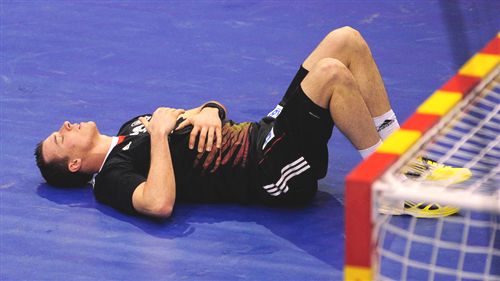My heading refers to the fact that, prior to today’s game, the German team had to be almost completely resigned to the fate of not qualifying, following their loss to Montenegro earlier in the week, the third loss in four matches against two not so fantastic opponents. So they depended on a miracle today, with a tiny possibility that they might get the spot as the best one of all the third-placed teams in the groups. While Slovenia helped the German cause by almost giving away the game at home against Belarus, it would then have taken a nine-goal loss for Russia in Austria to open the door for the Germans. The Russians did lost by 25-30, but they were never quite on verge of conceding the large margin that would have caused a complete disaster for the Russian handball, after their women’s team got knocked out from the World Championship.
Instead it is now the fate of the proud German team to have another setback, following the failure to qualify for the 2012 Olympics. And this reinforces the concerns that coach Heuberger, like his predecessor Heiner Brand and many German handball fans, has expressed for a while: it does not help to have the superior league in the world, if the successful clubs use their wealth to contract world-class NON-German players, especially for the key positions. This means that both the established German players, and especially the young talents, get limited playing time and are shoved into the background, while all the non-Germans carry their teams and gain all the valuable experience. Of course, in a free-market situation, this is not something that the German federation could easily regulate. In fact, Heuberger was now concerned that the failure to qualify for the EURO 2014 would make the Bundesliga teams inclined to cut back on player availability for the national team, right when the build-up for the 2015 World Championship and, indirectly, the fight for the 2016 Olympics must be started.
In many of the other groups, most of the decisions had been taken before today. However, FYRO Macedonia grabbed a place in EURO 2014 by beating Portugal and joining undefeated Spain from their group. Equally undefeated France was joined by Norway from what seemed to be the easiest group. Similarly, Sweden and Poland had no problems against their opponents. From the German group, the Czech Republic followed Montenegro, and Croatia and Hungary met expectations in their group. As noted earlier, Belarus went through from their group, together with Iceland who finished the group at home against Romania. Perhaps the most remarkable thing about that match-up was that it constituted the farewell celebration for longstanding team captain Olafur Stefansson. Finally, in the group where both Austria and Russia managed to qualify, although Russia just barely as the best third-placed team, the group winner was Serbia. And then, of course, we have the host country (and defending champion) Denmark. The draw for the groups will take place on June 21, and EURO 2014 will open on January 12.

